
HOMEWesley Britton’s Books,
|
Spies on FilmSpies on Television & RadioSpies in History & LiteratureThe James Bond Files |
|
Spies on Film ~ The Bigamist Bond –
The Behind-the-Scenes Story of The Champagne Spy
By Wesley Britton “Espionage is not a profession, it’s an art form.” – From the film, The Champagne Spy, Avrum Shalom, former head of Israeli Security Service, Shin Bet. 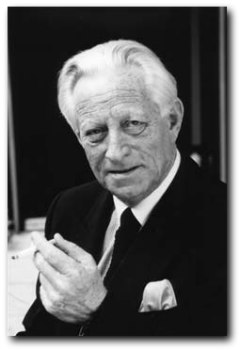
Wolfgang Lotz, aka Ze'ev Gur Arie. In August 1965, Wolfgang Lotz and his second wife Waltraud sat on the accused bench in the high court of the Republic of Egypt in Cairo. The “German” couple was accused of espionage and sabotage on behalf of Israel. The Presidential Palace demanded, and got, a sensational trial. After all, there was much to cause a sensation. And even more the prosecutors didn’t know. And even more Mrs. Waltraud Lotz didn’t know about her husband and co-defendant. Wolfgang Lotz was born in Germany in 1921. Following his military service for England during World War II, he moved to Israel shortly after it became an independent nation in 1948. Lotz joined the Israeli army and took on the name Ze’ev Gur Arie in the late 1950s. The Mossad, greatly attracted by his language skills – he was fluent in German, English, Hebrew and Arabic – drafted him in 1960. His mission: to penetrate the circle of German scientists developing weapons of mass destruction in Egypt. For Mossad, this German-born, Aryan blond and blue-eyed Major Gur Arie seemed the perfect candidate. For one thing, his Jewish mother had neglected to have him circumcised. Thus, unlike any other Jewish agent, Wolfgang Lotz could hold up under close physical scrutiny by enemy interrogators. (Note 1) After training in espionage and sabotage, his covert identity was built. Ze’ev Gur Arie went to Cairo as Wolfgang Lotz – former-Nazi German millionaire, playboy, and horse breeder. As he recounted in his 1972 autobiography, The Champagne Spy – Israel’s Master Spy Tells His Story, Lotz became known in Israel’s Intelligence circles for his high living and use of gadgets like transmitters in his boots and bathroom scale. He claimed to hide microfilm and explosives in bathroom soap. Running with the Egyptian elite, he attended dinner, cocktail, and swimming parties. All the while, he noted the titles and military ranks of the acquaintances he made. As time went on, his reports earned him the Mossad name “The Eye of Tel Aviv in Cairo.” But while he gathered and transmitted valuable information, Lotz began to succumb to his covert identity. Lotz was already married with a son when he fell in love with East German beauty Waltraud Martha Neumann and married her only two weeks after meeting her on a train. His handlers were stunned. How could such a well-trained agent make such a foolish error? 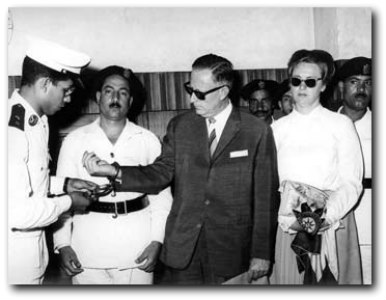
Lotz and his “wife” Waltrude in court, Cairo, August 1965. That Lotz didn’t keep his secret mission hidden from his new amour was even more worrisome for Tel Aviv. This potential blunder ended up ultimately paying rich dividends for Lotz and Mossad. The popular couple made important connections, some of whom were so highly-placed that Lotz often knew state secrets before the Egyptian government itself. He was able to visit closely-guarded, top-secret bases near the Suez Canal. He and Waltraud were given access to airports where the Egyptians stationed their newly acquired Soviet Migs. The Lotzs even took photographs of the aircraft at close range with their pilots standing proudly by. All the while, Lotz’s first wife and his son Oded were living in Paris with diplomatic status and completely unaware of Lotz’s whereabouts, his elite life-style cover or his new wife. As a father, Lotz was all but absent; Oded saw him only on occasional visits. Some 40 years later, Oded would recall a conversation that had taken place in a small corner café when he was 12: his father and another Mossad operative revealed to him that his dad was a covert agent leaving on a mission for the state. They told Oded that he must never speak about this secret because his father’s life depended on it. Oded kept the secret, even when he saw the newspaper photograph of his father with a new wife. From afar, he watched the news of his father’s capture, trial and imprisonment, and worried that this Wolfgang Lotz might also be executed like the famous spy, Eli Cohen. While the full story may never be known, one version has it Lotz had been picked up along with 42 other Germans in Egypt in an attempt by Egyptian President Abdul Nassar to appease the Russians, who claimed West German intelligence and CIA had penetrated the German enclave. Unbeknownst to Lotz, Nassar doubted the story and planned to merely hold the group a few weeks until Soviet officials returned home. 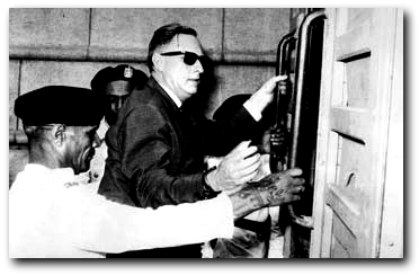
Egyptian authorities arrest Lotz in 1965. Thus, Lotz confessed his spy work but at the same time spun one of the most elaborate hoaxes of espionage history – Lotz said he was indeed an Israeli spy, but one blackmailed by Israel. He staunchly maintained his cover identity as a former-Nazi and revealed just enough truth to placate his interrogators. On August 21, 1965, Wolfgang Lotz was sentenced to life imprisonment with hard labor. Waltraud was sentenced to three years. Even in prison, Lotz’s interpersonal skills paid off. He and Waltraud averted the hard labor and instead made friends with fellow captives and jailors alike. In 1973 Lotz was traded back to Israel along with a few veterans of the botched Unit 131 “Operation Suzanna.” While Oded and his mother prepared to regain the father and husband whom they barely knew, Lotz simply didn’t come home to his first family. Torn between identities, addicted to the glamorous life he enjoyed during his covert mission, Lotz was among many in the spy business who would never find happiness in a world without secrets. Instead, he wrote books like his A Handbook for Spies (1980). The question the book addressed was – are you cut of the right cloth to be a secret agent? “When you’re a kid, secret agents and espionage belongs to the imagination, to films and books, but when it happens to you, at home, it’s thrilling.” – From the film, The Champagne Spy, Oded Gur Arie, Lotz’s son. In early 2007, the Lotz story was brought to the screen in a 90-minute feature documentary written and directed by Nadav Schirman in an Israeli-German co-production. Shot in France, Germany and Israel for a budget of half a million dollars, the film is intended to explore the involvement of the spy’s family and the heavy personal cost paid by those who live in the shadows. The Champagne Spy not only offers a bit of spy history, but the documentary itself breaks new ground. For the first time, senior Mossad and Israeli intelligence officials, along with former agents and operatives, spoke on camera about the role of the family and the personal, emotional toll found in the world of espionage. Amongst Israelis, even hypothetical discussion about Mossad is considered taboo. The Champagne Spy casts light on the plight of former spies trying to shed old skins and of those touched by their missions. As director Nadav Schirman asks, “What if James Bond had a family? What does he tell his son as he leaves on a secret mission? Is the family in danger? Are the families of the agent taken into account? They too must live in the shadows and end up paying a heavy price for serving the state.” During three years of research, the production team uncovered rare and exclusive materials (8-mm and 16-mm). There is unique footage from Lotz’s trial in Cairo, his time in prison as well as footage shot by his son during Lotz’s secret visits to Paris while on his mission. Oded Gur Arie (now 55) breaks his 40-year silence and journeys into his past in the presence of the filmmakers. For the first time, Oded talks about the complicated relationship with his father and confronts the heavy price he and his mother paid. The Filmmaker 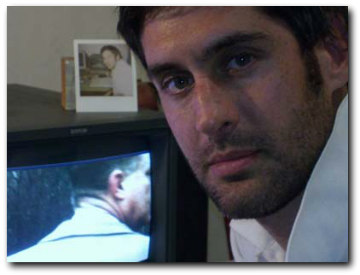
Nadav Schirman, writer and director of The Champagne Spy. Writer and director Nadav Schirman was born in Israel and raised in Paris, Montreal, and in the US. The Champagne Spy is his debut feature. “Espionage has always fascinated me,” he claims. “During the work on the film and after meeting many agents I realized that it’s not a glamorous job at all but rather a grey and very lonely one.” On the other hand, Schirman adds, “Wolfgang Lotz’s real-life exploits in Cairo could make any James Bond fiction pale in comparison – espionage in glamorous circles, posh riding clubs and exotic women. But behind the surface is a controversial man at odds with himself. A man who became addicted to his covert identity, a man without roots who left the country he risked his life for and a father who abandoned his only son. Lotz’s unique story, told through the eyes of his son, allows us to go beyond the cloaks of espionage, into a darker, more emotional realm, giving us the chance to examine the role of the family in the spy’s life.” To dig deeper into the project, I asked Nadav a number of questions to get behind the scenes of The Champagne Spy. Here’s what he had to say. Q – The Champagne Spy is your debut film. What was your background in making films before this project? Before The Champagne Spy, I was more involved in the business and commercial side of film making. I directed numerous publicity spots for television as well as various corporate films. I also produced a film called The Jerusalem Syndrome and a children’s TV show. Then I started writing. First for magazines and papers such as Variety and The Jerusalem Post. Then, when I turned thirty I finally understood what I wanted to do all along and wrote my first screenplay for The Champagne Spy. Q – What was your interest in espionage in general and Wolfgang Lotz in particular before setting out to make this film? I’ve always been fascinated by spies and espionage, particularly in cinema. I pretty much grew up on James Bond. When I read Lotz’s book, The Champagne Spy, which he presents as a real-life story, I said to myself, “This cannot be true, this guy is a real life James Bond” and then I started looking deeper and well, discovered that things are never what they seem to be. Q – It seems the story of Oded Gur is central to your documentary. Did you contact him early in your research and then see the direction your script would take? When Oded came aboard, and when I saw the 8-mm footage he shot as a kid of his father’s secret visits in Paris – then I knew I had a film. At first I tried to get the rights on the Lotz book and tried to locate Lotz. Some people told me he was training mercenaries in Africa, others told me that he was living in L.A., others that he was in Brazil, and so on. I simply couldn’t find the man and became frustrated. Then one day, I took my son to a swimming lesson and sat by the pool next to an older man. He asked me what I was doing, I said that I was trying to make a film about Lotz. He asked how it was going, I said, “Not good, I can’t find him or anyone from his family.” The man then said, “Maybe I can help you” and to my surprise asked for my phone number. Two weeks later I got a call. The voice at the end of the line said, “The man you’re looking for, he has a son, his name is Oded Gur Arie, he’s coming to Israel in a week, here’s his phone number” then he hung up before I could say ‘thank you’. Then I met with Oded and I think he trusted me but was skeptical about my ability to get the whole project off the ground. This, of course, changed the more progress I made, the more he became involved. For him it was a very big deal as it was the first time he would tell anyone about his experience and relationship with his dad. He had always kept it inside and now for the first time he would open up, in front of a film crew. That takes guts. Q – How were you able to gather the interest and support of Mossad agents and officials considering their usual reluctance to talk about their work? Did you have difficulties getting permission regarding formerly classified information? As soon as they understood that I was more interested in the personal side of Lotz’s story, and the job, they started becoming more interested. I met many times with former agents and operatives from his unit, got to know them and let them know me. I discovered a warm and closely knit group of people, good people, exemplary in many ways. And as I warmed up to them and them to me, things became easier and people were opening up. Q – What were the most surprising revelations you encountered? Was the family story your emphasis from the beginning or did that evolve as you went along? During the research we discovered many surprising revelations that were never mentioned in any of the materials publicly available. But when I first saw the 8-mm footage that 12-year-old Oded had shot in Paris then I knew I had my film. In the footage he shot, you clearly see Lotz, during his secret visits to Paris (1962-1964) – how he’s distanced himself from the family. His body language fascinated me. He seemed to be getting deeper in another identity and though he’s there with his wife and son he seems not there, his mind some other place. The physical distance between him and his wife in every shot was striking. At 12 – Oded had unknowingly documented his family'’ break up and his dad’s sinking into his double identity. I knew then that the family would be my anchor to tell the story. 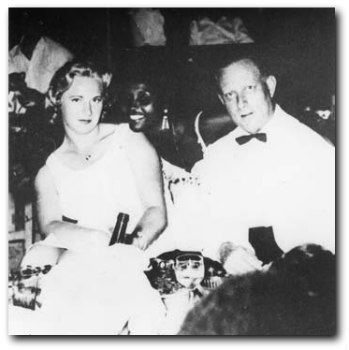
Before their arrest, Waltrude and Wolfgang enjoyed the high life, frequenting such night spots as Sahara City, in Cairo. 1961. Q – Do you think the Lotz story is unique or is it representative of the lives of other undercover operatives? Does it tell us anything about espionage of the era or does it reveal more general themes? Lotz’s story is both unique and holds the key to better understanding the hardships of most undercover agents. His character and the circumstances of his story are unique. A Jew adopting the identity of a former Nazi, millionaire, playboy and horse breeder, in 1960’s Cairo. That’s unique. Also his personal history and psychological profile make him unique at the same time. The hardships that he endured, like the loneliness on the mission, the identity crisis when returning home, the addiction to his “second skin” – all these seem to be part of that period’s undercover agents, or “warriors” as they were called by the Mossad (an “agent” being a foreigner who’s hired, paid for, whereas “warriors” are fighters with military backgrounds, and hopefully, Zionistic ideals). Q – What comparison can you make between actual spycraft and what most viewers see in fanciful films like the James Bond series? For one, it seems that many of the Mossad agents in Cairo at that time led a posh lifestyle undercover. Money being a magnet and maybe an object of trust in the Arab world, they had plenty to spend. This “cushion” is of course exaggerated in James Bond but it does hold truth, as often information is gathered at the top of the pyramid, where the power (and the money) is. So to be part of that you need to have credentials, and the cash to back them up. I discovered the life of a “resident agent” (many years undercover) to be a lonely one – even tough one. The spy may be surrounded by “friends” and an entourage – but the agent is ultimately alone, his real self kept under wraps, not being able to talk about it with anyone. It’s more of the Le Carré’s fare, grey, lonely, a game of patience, drop by drop rather than boom bang, get in, steal the plans, kiss the girl and have drinks with another. Q – What reactions have viewers had to the screenings you’ve had so far? I understand members of the Mossad had a very favorable response. The Champagne Spy’s first screening was in March at the Doc Aviv, Tel Aviv International film festival. The screenings were fully sold out, even the one the festival added due to public demand. I was later told that at each screening about a fifth of the audience was from “The Office” as Mossad is called here. The film went on to win the Jury Prize and is now nominated for Best Documentary at the Israeli Academy Award and best film at the Israeli Documentary Forum (the Oscars of documentaries here). So the audiences seem to be touched by it. The film was also shown in closed screenings for former Mossad and Intel agents and operatives followed by panel discussions about the issues raised in the film. They all seem to want to talk about it, about the personal and emotional cost of the work. I think because the film does not criticize, nor reveals procedures, but rather focuses on the human story and its emotional elements, the community is not threatened by it but instead uses the film as a trigger to discuss things that are normally bottled up inside each one. We were also told that the film is shown to agents in training to raise the awareness to the family issues etc. Q – What are your plans for screenings of the film around the world and in the U.S.? What plans are in the works for any DVD release? How can prospective viewers get information about The Champagne Spy? The film keeps being invited to international film festivals around the globe. The U.S. premiere was at the Seattle International Film Festival on May 31 and June 1, 2007. Then the film went on to Los Angeles Film Festival for June 23, 24. We have a German premiere planned in Hamburg around September 29. London BFI in October. There will be either Vancouver or Toronto for a Canadian premiere. Currently we’re sorting out the invitations for the rest of the year. Reviews of The Champagne Spy can be found in Screen Daily and Variety. After this interview was completed, Collina Films signed Schirman to pen an English-language adaptation of The Champagne Spy. In addition, Nadav says he’s working on a fictionalized version of the story. So expect bulletins in coming months. Addenda ~ July 24, 2007 ~ The Champagne Spy is among the five nominees for Best Documentary Feature in this year’s Israeli Academy Awards, held in September, 2007. This comes after winning four Awards at the Israeli Documentary Forum in June, 2007. 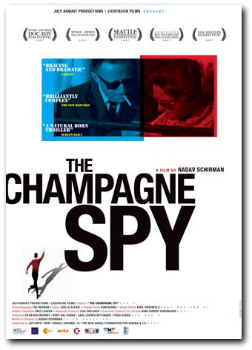 Cast ~ Oded Gur Arie – Lotz’s son
Credits ~ Director/writer – Nadav Schirman
Notes ~ Note 1 – Avri El-Ad, a Unit 131 operative of similar background and language skills well-placed in Egypt for Operation Suzanna – aka The Lavon Affair – during the 50s, reported undergoing painful surgery to remove physical evidence of his “Jewishness” in Decline of Honor. Photographs courtesy of Nadav Schirman and Harvey Chertok. |